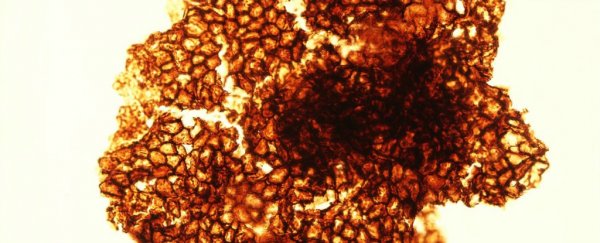You might get chills every time Kepler discovers a new, Earth-like planet that might be harbouring some form of alien life, but it's important to remember that we're not done exploring life on our own planet yet - not even close. And we still don't fully understand how life on Earth actually began, or when it made that fateful leap from simple, single-celled organisms to complex multicellular creatures that gave rise to us.
Previous research has suggested that complex life appeared on Earth roughly 600 million years ago, after spending about 1 billion years in its simplest form - a period called the boring billion, because evolution seemed to 'stop' for a time. Now, some fossils recently uncovered in China suggest that complex life actually started 1.5 billion years ago.
The 1.56-billion-year-old fossils, which were found in China's Yanshan region, are of multicellular eukaryotes - organisms with differentiated cells that each contain a nucleus and genetic material bound by a membrane.
Those super early eukaryotes have got nothing on us in terms of complexity, but they are complex enough to show that life on Earth made the leap from single-celled to multi-celled organisms - a shift that indicates evolution was finally kicking into gear.
The discovery was made by researchers from the Nanjing Institute of Geology and Palaeontology in China, and it wasn't just one fossil - the team has reportly found 167 measureable specimens, with the largest measuring 30 by 8 cm (12 by 3 inches).
"Our discovery pushes back nearly one billion years the appearance of macroscopic, multicellular eukaryotes compared to previous research," one of the team, Maoyan Zhu, told the AFP.
The team says these fossils are evidence that Earth's oxygen levels were high enough 1.56 billion years ago to support these complex life forms, but other researchers are a bit more hesitant to dismiss previous fossil-based research, which suggests that complex life came about 600 million years ago.
 The newly-found fossils. Maoyan Zhu
The newly-found fossils. Maoyan Zhu
This new debate all comes down to whether or not the fossils are actually of eukaryotes or bacteria. Basically, bacteria are unicellular, meaning they aren't complex life forms with easily differentiated nuclei. And it's possible that these newly discovered fossils are actually bacterial colonies that, over the years, just ended up looking a lot like eukaryotes.
"There is nothing here to suggest that the specimens are eukaryotic, as opposed to bacterial," zoologist Jonathan Antcliffe from the University of Oxford in the UK, who wasn't involved in the study, told the AFP.
Other researchers echo Antcliffe's criticism, saying the samples simply lack enough detail to draw a conclusion. In short, the debate comes down to the fact that researchers do not agree on what these fossils are.
The team will likely need to find a more detailed fossil before other researchers start to agree. But if they are correct, the find is one of the most significant in recent memory, because it forces us to rethink how and when life came about on our planet.
The team's findings were published in Nature Communications.
